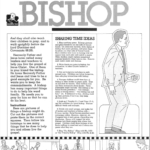[ad_1]
The benefits of journaling — especially Bible journaling — are profound. Even children can benefit from this practice. Read on to discover how!
Bible journaling, which has become more popular in the faith community, is actually a spiritual discipline. And the practice nurtures other spiritual disciplines, such as prayer, meditation and Bible study. Bible journaling for kids is a fun, meaningful way to help them grow closer to Jesus and establish lifelong faith habits.
Journaling, quite simply, involves making a record of something. That’s where the similarities end, though. Because from there, what’s recorded, how it’s recorded, and how much is recorded reflects someone’s personality, spiritual maturity and processing pathway. The actual form of journaling is specific to the person doing it.
In a way, the Bible is a collection of journaling. Paul’s letters describe events, struggles and how he thinks certain issues should be resolved. David provides insight into his personal spiritual journal through the Psalms—a poetic and musical journal. Matthew, Mark, Luke, and John journal about events they all witness, but each gives us a different view because they journal from a personal perspective. Much of the Bible is God’s inspired Word essentially being passed through the journals of faithful followers.
Although this article is about intentionally equipping children, the benefits of journaling the Bible also apply to teenagers and adults. So if you’re not journaling yet, try some of the ideas and approaches. The benefits of journaling are great. Not only for today but for tomorrow and for years down the road!
7 Benefits of Journaling the Bible
1. It helps give clarity.
When you’re having a difficult time understanding a concept or a Scripture, writing down your random thoughts and then reviewing what you’ve written can be very insightful. It’s like rotating a piece of a puzzle and when you hold it a certain way, you see where it fits all of a sudden.
In times of confusion, journaling can be the instrument that helps kids sort out what questions they have and need to ask. What’s not making sense? Where do I get lost?
2. It provides a safe place.
Second, there’s no ridicule or wrong in journaling. The words penned come from the heart. They may be very raw feelings, but they represent personal truth. Remind children and adults that journaling is private and warrants respect. Unless a child offers to share what’s written, guard the privacy of their journaling. When I used Bible journaling for kids, our group regularly held one another accountable. Plus, I gave them a chance to share something they had journaled.
At first, very few read excerpts. But after awhile, they really enjoyed sharing entries. This was especially true of those that were evidence of how they had worked through an issue. Because kids recognized how God was working in their lives, they were very comfortable sharing those journal entries.
3. Journaling is a storehouse for years to come.
One of the most valuable aspects of journaling is being able to look back. A journal is a record of spiritual growth. Through the comments and perspectives shared there, years later a child will be able to celebrate and embrace the journey that God has taken him on.
It’s so rewarding to read about a spiritual struggle and then read months later how God has taken that incident and catapulted your spiritual understanding. That’s why it’s really important to date each entry in your journal. Without the words penned in the journal, it’s easy to miss out on recognizing where the spiritual journey has actually taken you.
4. It helps you meditate on God’s Word.
Psalm 1:2 reminds us, “…his delight is in the law of the Lord, and in His law he mediates day and night.” It’s good for kids to stop, get quiet, and ponder God’s Word. But these days, it’s not so easy. Bible journaling can especially help kids who have a difficult time quieting their spirits. As they contemplate what to write, their minds are stretching and reaching for thoughts that are deeper than surface, off-the-cuff, “church-y” answers.
[ad_2]
Source link









You must be logged in to post a comment.